LEGL300 Taxation Law: Harding v Commissioner of Taxation Case Note
VerifiedAdded on 2023/04/21
|8
|1650
|391
Case Study
AI Summary
This assignment provides a detailed case study of Harding v Commissioner of Taxation, focusing on the legal issues surrounding Australian residency for taxation purposes. It summarizes the key facts, legal principles, and judgments from both the initial decision and the appeal. The analysis includes discussions of the 'resides' test, 'permanent place of abode' test, and the application of section 6(1) of the ITAA 1936. The study also examines a hypothetical scenario involving Misha, applying the legal principles derived from the Harding case and other relevant precedents to determine her residency status for tax purposes. Ultimately, the assignment concludes that Misha would likely be considered an Australian resident based on the domicile test and the temporary nature of her overseas stay. Desklib provides a platform for students to access similar solved assignments and study resources.
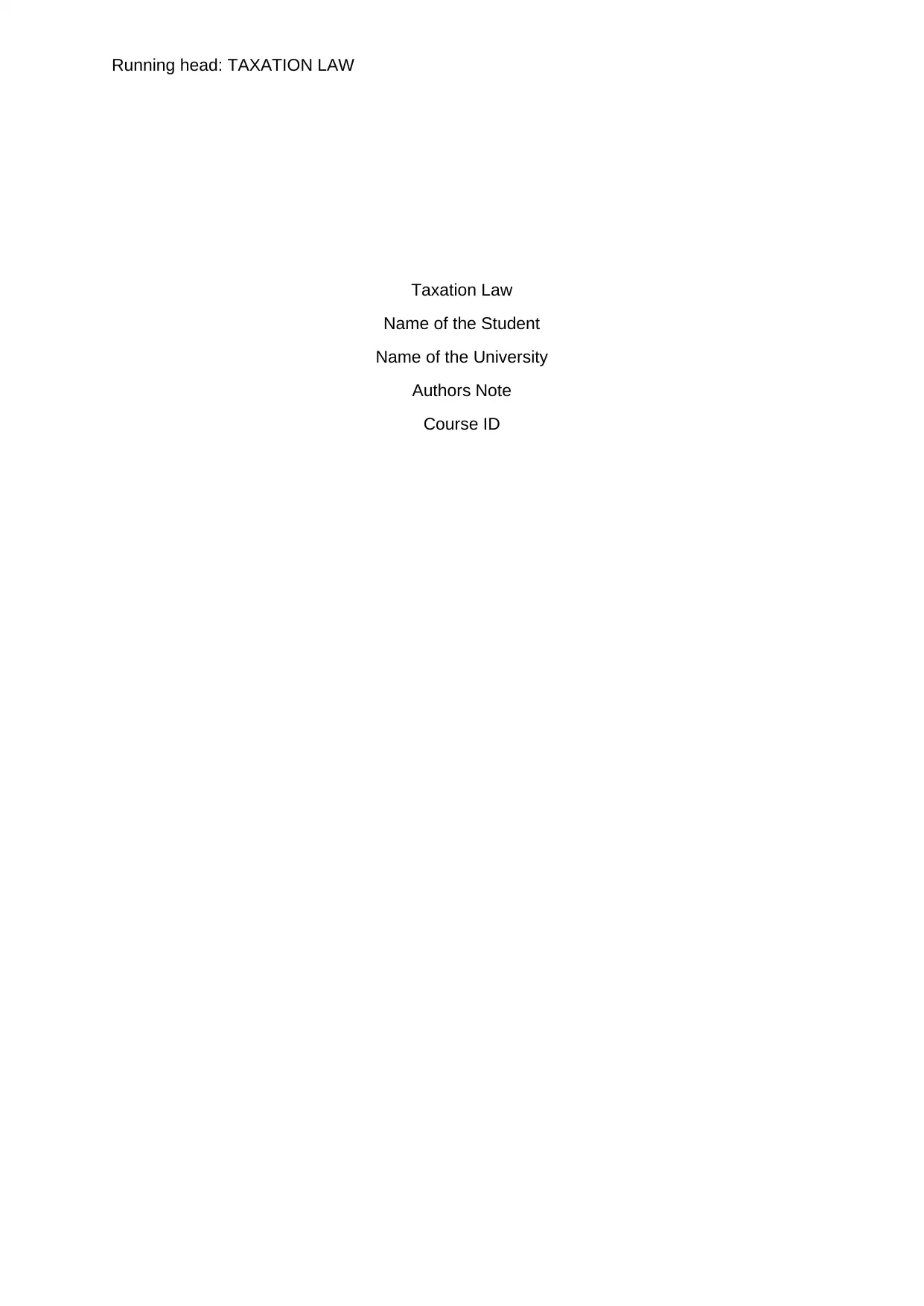
Running head: TAXATION LAW
Taxation Law
Name of the Student
Name of the University
Authors Note
Course ID
Taxation Law
Name of the Student
Name of the University
Authors Note
Course ID
Paraphrase This Document
Need a fresh take? Get an instant paraphrase of this document with our AI Paraphraser
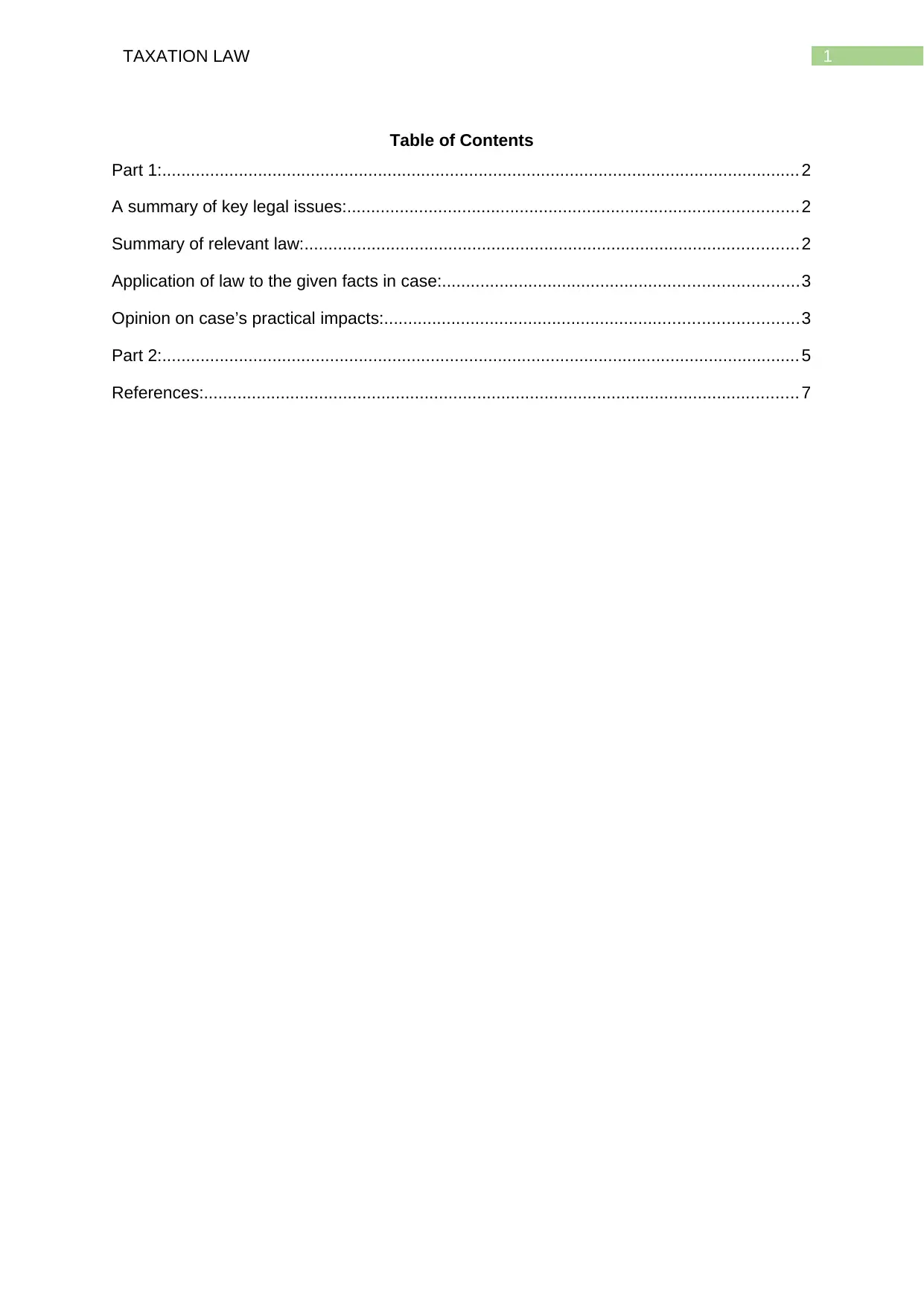
1TAXATION LAW
Table of Contents
Part 1:..................................................................................................................................... 2
A summary of key legal issues:..............................................................................................2
Summary of relevant law:.......................................................................................................2
Application of law to the given facts in case:..........................................................................3
Opinion on case’s practical impacts:......................................................................................3
Part 2:..................................................................................................................................... 5
References:............................................................................................................................ 7
Table of Contents
Part 1:..................................................................................................................................... 2
A summary of key legal issues:..............................................................................................2
Summary of relevant law:.......................................................................................................2
Application of law to the given facts in case:..........................................................................3
Opinion on case’s practical impacts:......................................................................................3
Part 2:..................................................................................................................................... 5
References:............................................................................................................................ 7
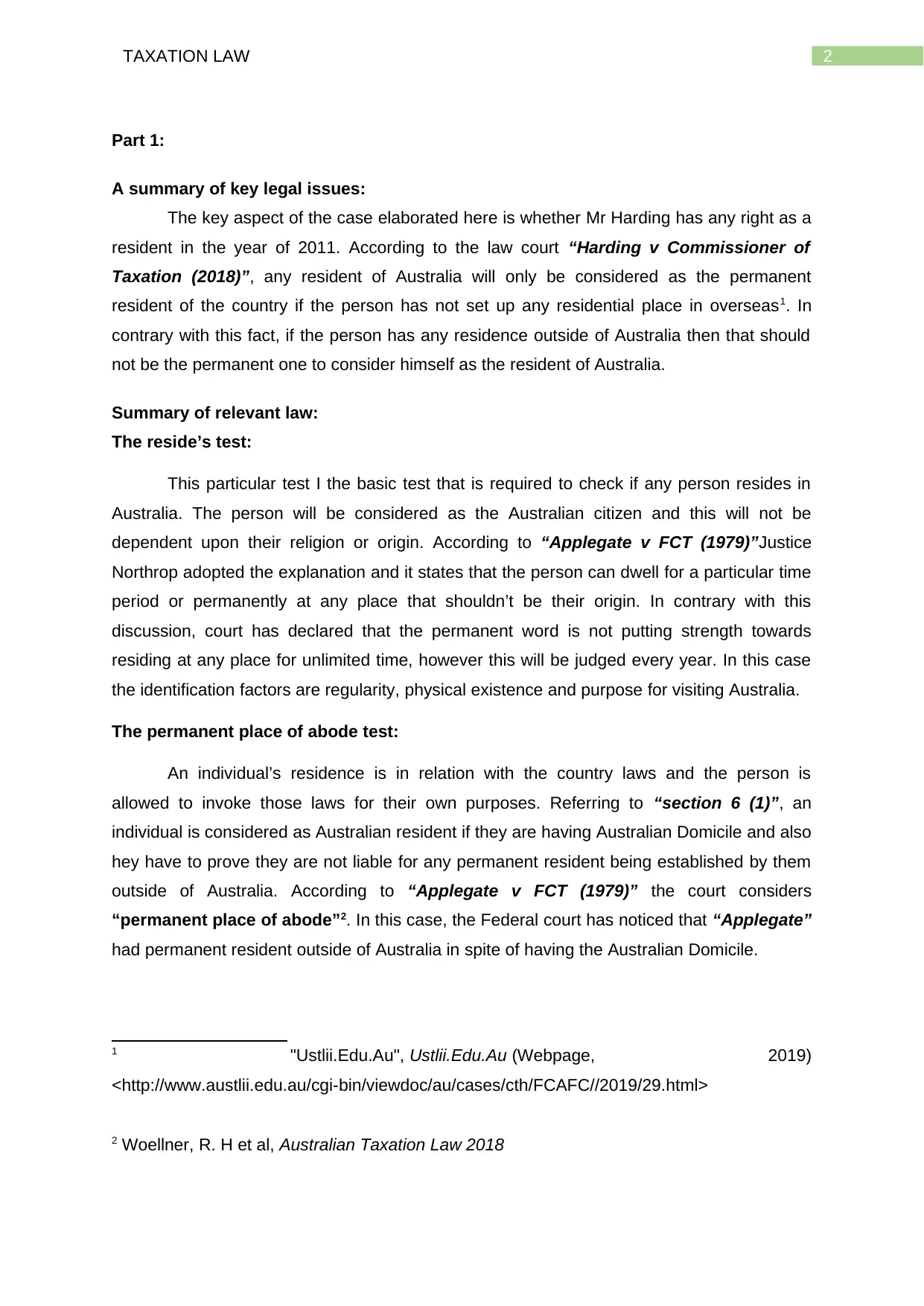
2TAXATION LAW
Part 1:
A summary of key legal issues:
The key aspect of the case elaborated here is whether Mr Harding has any right as a
resident in the year of 2011. According to the law court “Harding v Commissioner of
Taxation (2018)”, any resident of Australia will only be considered as the permanent
resident of the country if the person has not set up any residential place in overseas1. In
contrary with this fact, if the person has any residence outside of Australia then that should
not be the permanent one to consider himself as the resident of Australia.
Summary of relevant law:
The reside’s test:
This particular test I the basic test that is required to check if any person resides in
Australia. The person will be considered as the Australian citizen and this will not be
dependent upon their religion or origin. According to “Applegate v FCT (1979)”Justice
Northrop adopted the explanation and it states that the person can dwell for a particular time
period or permanently at any place that shouldn’t be their origin. In contrary with this
discussion, court has declared that the permanent word is not putting strength towards
residing at any place for unlimited time, however this will be judged every year. In this case
the identification factors are regularity, physical existence and purpose for visiting Australia.
The permanent place of abode test:
An individual’s residence is in relation with the country laws and the person is
allowed to invoke those laws for their own purposes. Referring to “section 6 (1)”, an
individual is considered as Australian resident if they are having Australian Domicile and also
hey have to prove they are not liable for any permanent resident being established by them
outside of Australia. According to “Applegate v FCT (1979)” the court considers
“permanent place of abode”2. In this case, the Federal court has noticed that “Applegate”
had permanent resident outside of Australia in spite of having the Australian Domicile.
1 "Ustlii.Edu.Au", Ustlii.Edu.Au (Webpage, 2019)
<http://www.austlii.edu.au/cgi-bin/viewdoc/au/cases/cth/FCAFC//2019/29.html>
2 Woellner, R. H et al, Australian Taxation Law 2018
Part 1:
A summary of key legal issues:
The key aspect of the case elaborated here is whether Mr Harding has any right as a
resident in the year of 2011. According to the law court “Harding v Commissioner of
Taxation (2018)”, any resident of Australia will only be considered as the permanent
resident of the country if the person has not set up any residential place in overseas1. In
contrary with this fact, if the person has any residence outside of Australia then that should
not be the permanent one to consider himself as the resident of Australia.
Summary of relevant law:
The reside’s test:
This particular test I the basic test that is required to check if any person resides in
Australia. The person will be considered as the Australian citizen and this will not be
dependent upon their religion or origin. According to “Applegate v FCT (1979)”Justice
Northrop adopted the explanation and it states that the person can dwell for a particular time
period or permanently at any place that shouldn’t be their origin. In contrary with this
discussion, court has declared that the permanent word is not putting strength towards
residing at any place for unlimited time, however this will be judged every year. In this case
the identification factors are regularity, physical existence and purpose for visiting Australia.
The permanent place of abode test:
An individual’s residence is in relation with the country laws and the person is
allowed to invoke those laws for their own purposes. Referring to “section 6 (1)”, an
individual is considered as Australian resident if they are having Australian Domicile and also
hey have to prove they are not liable for any permanent resident being established by them
outside of Australia. According to “Applegate v FCT (1979)” the court considers
“permanent place of abode”2. In this case, the Federal court has noticed that “Applegate”
had permanent resident outside of Australia in spite of having the Australian Domicile.
1 "Ustlii.Edu.Au", Ustlii.Edu.Au (Webpage, 2019)
<http://www.austlii.edu.au/cgi-bin/viewdoc/au/cases/cth/FCAFC//2019/29.html>
2 Woellner, R. H et al, Australian Taxation Law 2018
⊘ This is a preview!⊘
Do you want full access?
Subscribe today to unlock all pages.

Trusted by 1+ million students worldwide
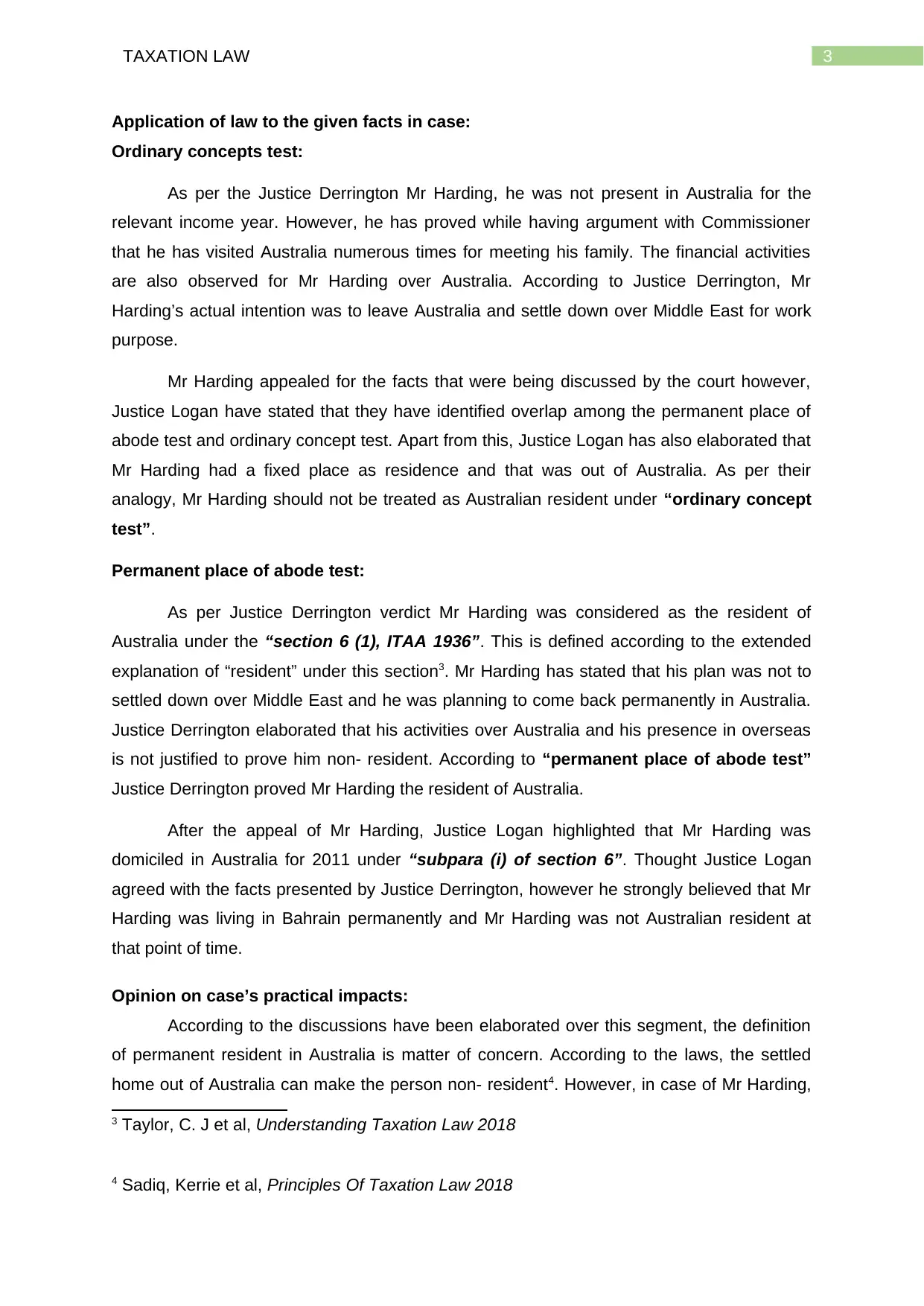
3TAXATION LAW
Application of law to the given facts in case:
Ordinary concepts test:
As per the Justice Derrington Mr Harding, he was not present in Australia for the
relevant income year. However, he has proved while having argument with Commissioner
that he has visited Australia numerous times for meeting his family. The financial activities
are also observed for Mr Harding over Australia. According to Justice Derrington, Mr
Harding’s actual intention was to leave Australia and settle down over Middle East for work
purpose.
Mr Harding appealed for the facts that were being discussed by the court however,
Justice Logan have stated that they have identified overlap among the permanent place of
abode test and ordinary concept test. Apart from this, Justice Logan has also elaborated that
Mr Harding had a fixed place as residence and that was out of Australia. As per their
analogy, Mr Harding should not be treated as Australian resident under “ordinary concept
test”.
Permanent place of abode test:
As per Justice Derrington verdict Mr Harding was considered as the resident of
Australia under the “section 6 (1), ITAA 1936”. This is defined according to the extended
explanation of “resident” under this section3. Mr Harding has stated that his plan was not to
settled down over Middle East and he was planning to come back permanently in Australia.
Justice Derrington elaborated that his activities over Australia and his presence in overseas
is not justified to prove him non- resident. According to “permanent place of abode test”
Justice Derrington proved Mr Harding the resident of Australia.
After the appeal of Mr Harding, Justice Logan highlighted that Mr Harding was
domiciled in Australia for 2011 under “subpara (i) of section 6”. Thought Justice Logan
agreed with the facts presented by Justice Derrington, however he strongly believed that Mr
Harding was living in Bahrain permanently and Mr Harding was not Australian resident at
that point of time.
Opinion on case’s practical impacts:
According to the discussions have been elaborated over this segment, the definition
of permanent resident in Australia is matter of concern. According to the laws, the settled
home out of Australia can make the person non- resident4. However, in case of Mr Harding,
3 Taylor, C. J et al, Understanding Taxation Law 2018
4 Sadiq, Kerrie et al, Principles Of Taxation Law 2018
Application of law to the given facts in case:
Ordinary concepts test:
As per the Justice Derrington Mr Harding, he was not present in Australia for the
relevant income year. However, he has proved while having argument with Commissioner
that he has visited Australia numerous times for meeting his family. The financial activities
are also observed for Mr Harding over Australia. According to Justice Derrington, Mr
Harding’s actual intention was to leave Australia and settle down over Middle East for work
purpose.
Mr Harding appealed for the facts that were being discussed by the court however,
Justice Logan have stated that they have identified overlap among the permanent place of
abode test and ordinary concept test. Apart from this, Justice Logan has also elaborated that
Mr Harding had a fixed place as residence and that was out of Australia. As per their
analogy, Mr Harding should not be treated as Australian resident under “ordinary concept
test”.
Permanent place of abode test:
As per Justice Derrington verdict Mr Harding was considered as the resident of
Australia under the “section 6 (1), ITAA 1936”. This is defined according to the extended
explanation of “resident” under this section3. Mr Harding has stated that his plan was not to
settled down over Middle East and he was planning to come back permanently in Australia.
Justice Derrington elaborated that his activities over Australia and his presence in overseas
is not justified to prove him non- resident. According to “permanent place of abode test”
Justice Derrington proved Mr Harding the resident of Australia.
After the appeal of Mr Harding, Justice Logan highlighted that Mr Harding was
domiciled in Australia for 2011 under “subpara (i) of section 6”. Thought Justice Logan
agreed with the facts presented by Justice Derrington, however he strongly believed that Mr
Harding was living in Bahrain permanently and Mr Harding was not Australian resident at
that point of time.
Opinion on case’s practical impacts:
According to the discussions have been elaborated over this segment, the definition
of permanent resident in Australia is matter of concern. According to the laws, the settled
home out of Australia can make the person non- resident4. However, in case of Mr Harding,
3 Taylor, C. J et al, Understanding Taxation Law 2018
4 Sadiq, Kerrie et al, Principles Of Taxation Law 2018
Paraphrase This Document
Need a fresh take? Get an instant paraphrase of this document with our AI Paraphraser
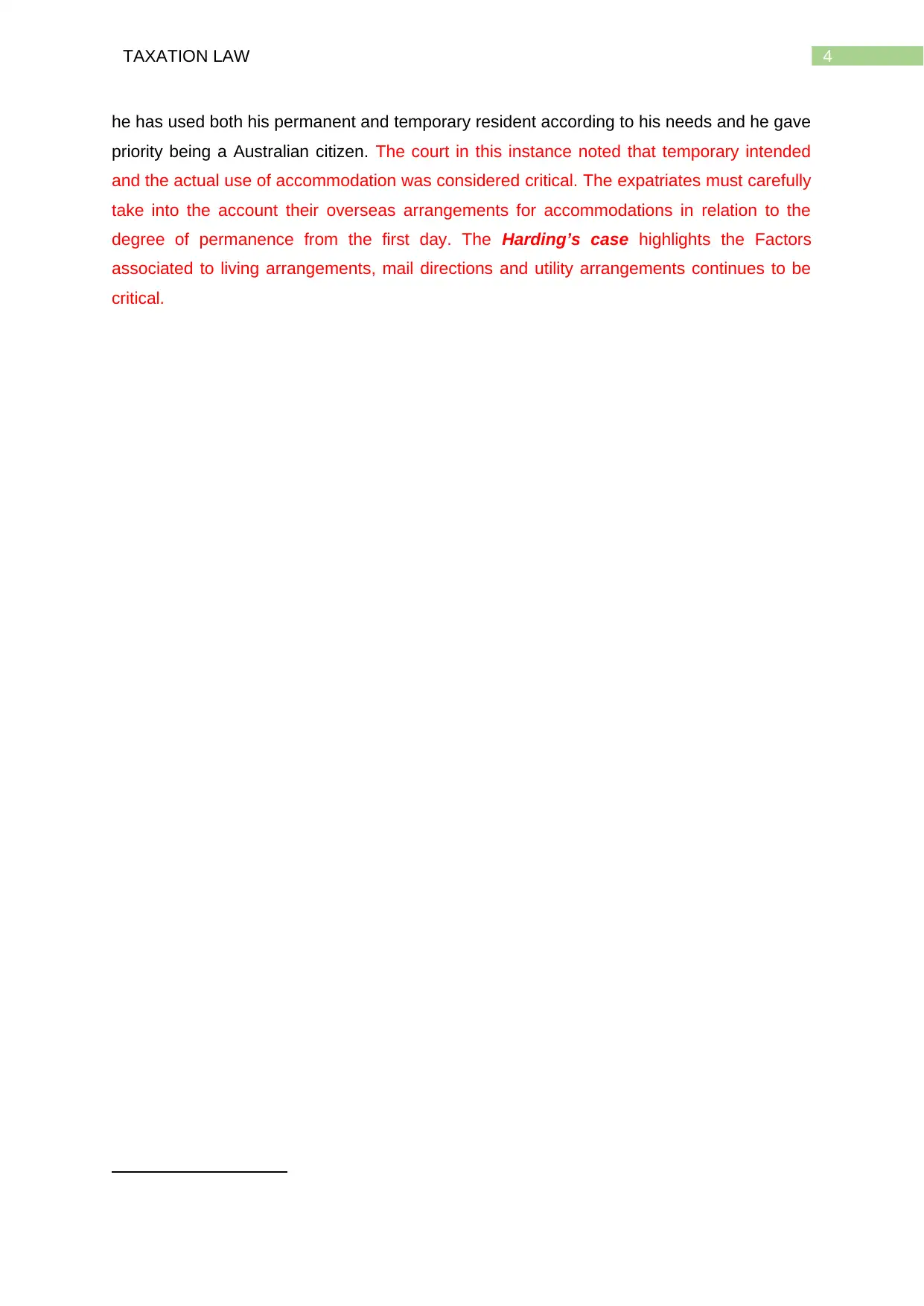
4TAXATION LAW
he has used both his permanent and temporary resident according to his needs and he gave
priority being a Australian citizen. The court in this instance noted that temporary intended
and the actual use of accommodation was considered critical. The expatriates must carefully
take into the account their overseas arrangements for accommodations in relation to the
degree of permanence from the first day. The Harding’s case highlights the Factors
associated to living arrangements, mail directions and utility arrangements continues to be
critical.
he has used both his permanent and temporary resident according to his needs and he gave
priority being a Australian citizen. The court in this instance noted that temporary intended
and the actual use of accommodation was considered critical. The expatriates must carefully
take into the account their overseas arrangements for accommodations in relation to the
degree of permanence from the first day. The Harding’s case highlights the Factors
associated to living arrangements, mail directions and utility arrangements continues to be
critical.
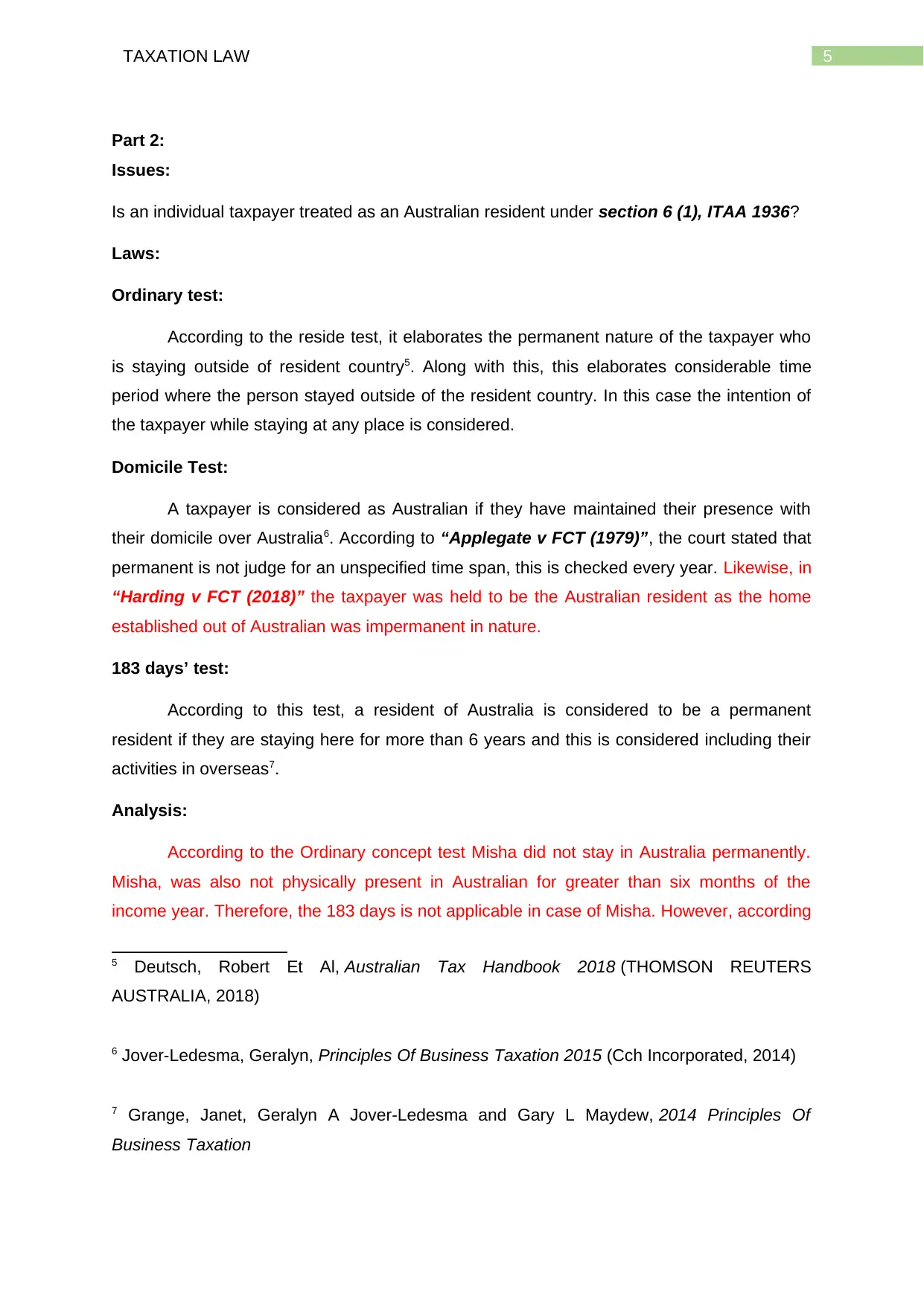
5TAXATION LAW
Part 2:
Issues:
Is an individual taxpayer treated as an Australian resident under section 6 (1), ITAA 1936?
Laws:
Ordinary test:
According to the reside test, it elaborates the permanent nature of the taxpayer who
is staying outside of resident country5. Along with this, this elaborates considerable time
period where the person stayed outside of the resident country. In this case the intention of
the taxpayer while staying at any place is considered.
Domicile Test:
A taxpayer is considered as Australian if they have maintained their presence with
their domicile over Australia6. According to “Applegate v FCT (1979)”, the court stated that
permanent is not judge for an unspecified time span, this is checked every year. Likewise, in
“Harding v FCT (2018)” the taxpayer was held to be the Australian resident as the home
established out of Australian was impermanent in nature.
183 days’ test:
According to this test, a resident of Australia is considered to be a permanent
resident if they are staying here for more than 6 years and this is considered including their
activities in overseas7.
Analysis:
According to the Ordinary concept test Misha did not stay in Australia permanently.
Misha, was also not physically present in Australian for greater than six months of the
income year. Therefore, the 183 days is not applicable in case of Misha. However, according
5 Deutsch, Robert Et Al, Australian Tax Handbook 2018 (THOMSON REUTERS
AUSTRALIA, 2018)
6 Jover-Ledesma, Geralyn, Principles Of Business Taxation 2015 (Cch Incorporated, 2014)
7 Grange, Janet, Geralyn A Jover-Ledesma and Gary L Maydew, 2014 Principles Of
Business Taxation
Part 2:
Issues:
Is an individual taxpayer treated as an Australian resident under section 6 (1), ITAA 1936?
Laws:
Ordinary test:
According to the reside test, it elaborates the permanent nature of the taxpayer who
is staying outside of resident country5. Along with this, this elaborates considerable time
period where the person stayed outside of the resident country. In this case the intention of
the taxpayer while staying at any place is considered.
Domicile Test:
A taxpayer is considered as Australian if they have maintained their presence with
their domicile over Australia6. According to “Applegate v FCT (1979)”, the court stated that
permanent is not judge for an unspecified time span, this is checked every year. Likewise, in
“Harding v FCT (2018)” the taxpayer was held to be the Australian resident as the home
established out of Australian was impermanent in nature.
183 days’ test:
According to this test, a resident of Australia is considered to be a permanent
resident if they are staying here for more than 6 years and this is considered including their
activities in overseas7.
Analysis:
According to the Ordinary concept test Misha did not stay in Australia permanently.
Misha, was also not physically present in Australian for greater than six months of the
income year. Therefore, the 183 days is not applicable in case of Misha. However, according
5 Deutsch, Robert Et Al, Australian Tax Handbook 2018 (THOMSON REUTERS
AUSTRALIA, 2018)
6 Jover-Ledesma, Geralyn, Principles Of Business Taxation 2015 (Cch Incorporated, 2014)
7 Grange, Janet, Geralyn A Jover-Ledesma and Gary L Maydew, 2014 Principles Of
Business Taxation
⊘ This is a preview!⊘
Do you want full access?
Subscribe today to unlock all pages.

Trusted by 1+ million students worldwide
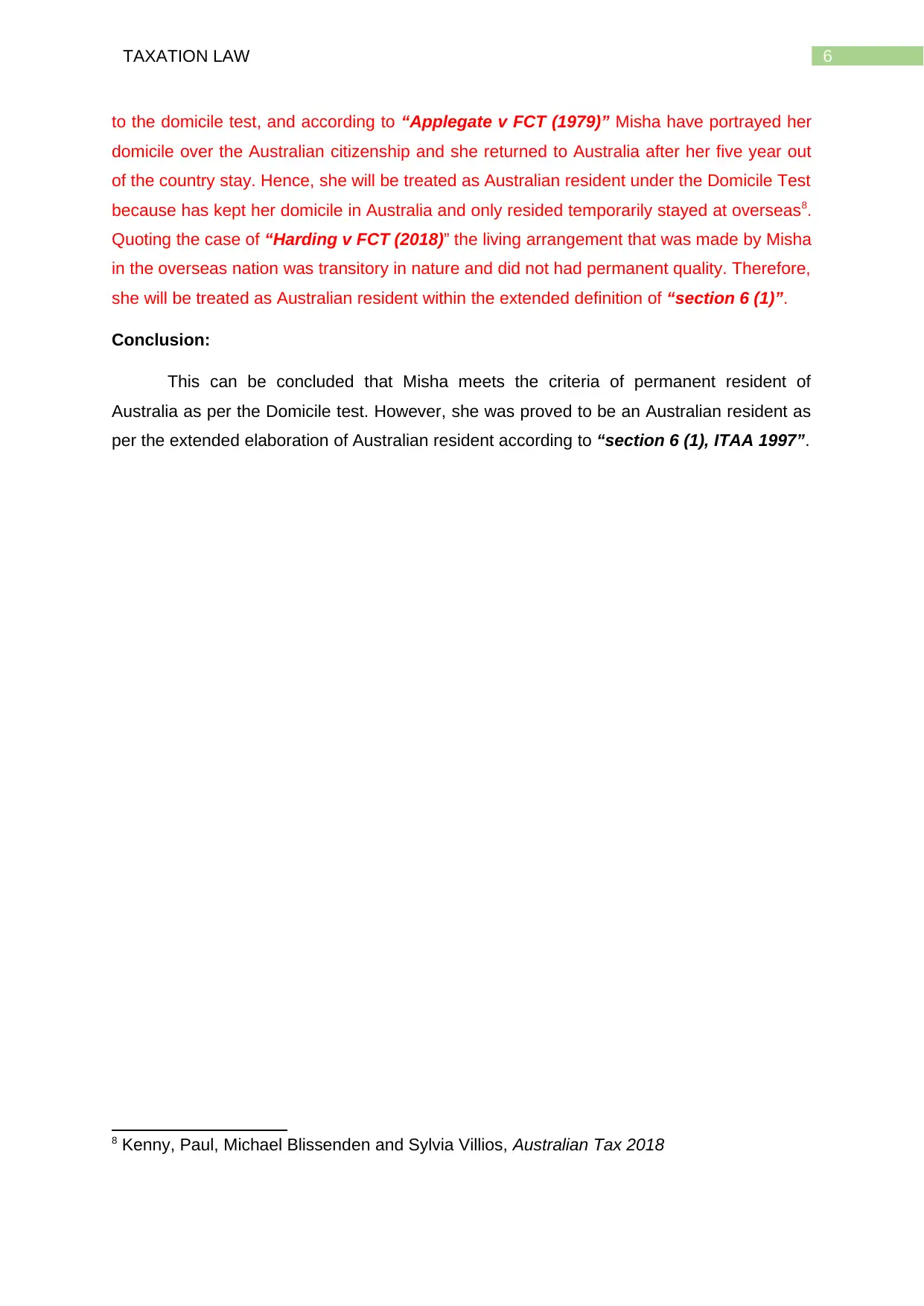
6TAXATION LAW
to the domicile test, and according to “Applegate v FCT (1979)” Misha have portrayed her
domicile over the Australian citizenship and she returned to Australia after her five year out
of the country stay. Hence, she will be treated as Australian resident under the Domicile Test
because has kept her domicile in Australia and only resided temporarily stayed at overseas8.
Quoting the case of “Harding v FCT (2018)” the living arrangement that was made by Misha
in the overseas nation was transitory in nature and did not had permanent quality. Therefore,
she will be treated as Australian resident within the extended definition of “section 6 (1)”.
Conclusion:
This can be concluded that Misha meets the criteria of permanent resident of
Australia as per the Domicile test. However, she was proved to be an Australian resident as
per the extended elaboration of Australian resident according to “section 6 (1), ITAA 1997”.
8 Kenny, Paul, Michael Blissenden and Sylvia Villios, Australian Tax 2018
to the domicile test, and according to “Applegate v FCT (1979)” Misha have portrayed her
domicile over the Australian citizenship and she returned to Australia after her five year out
of the country stay. Hence, she will be treated as Australian resident under the Domicile Test
because has kept her domicile in Australia and only resided temporarily stayed at overseas8.
Quoting the case of “Harding v FCT (2018)” the living arrangement that was made by Misha
in the overseas nation was transitory in nature and did not had permanent quality. Therefore,
she will be treated as Australian resident within the extended definition of “section 6 (1)”.
Conclusion:
This can be concluded that Misha meets the criteria of permanent resident of
Australia as per the Domicile test. However, she was proved to be an Australian resident as
per the extended elaboration of Australian resident according to “section 6 (1), ITAA 1997”.
8 Kenny, Paul, Michael Blissenden and Sylvia Villios, Australian Tax 2018
Paraphrase This Document
Need a fresh take? Get an instant paraphrase of this document with our AI Paraphraser
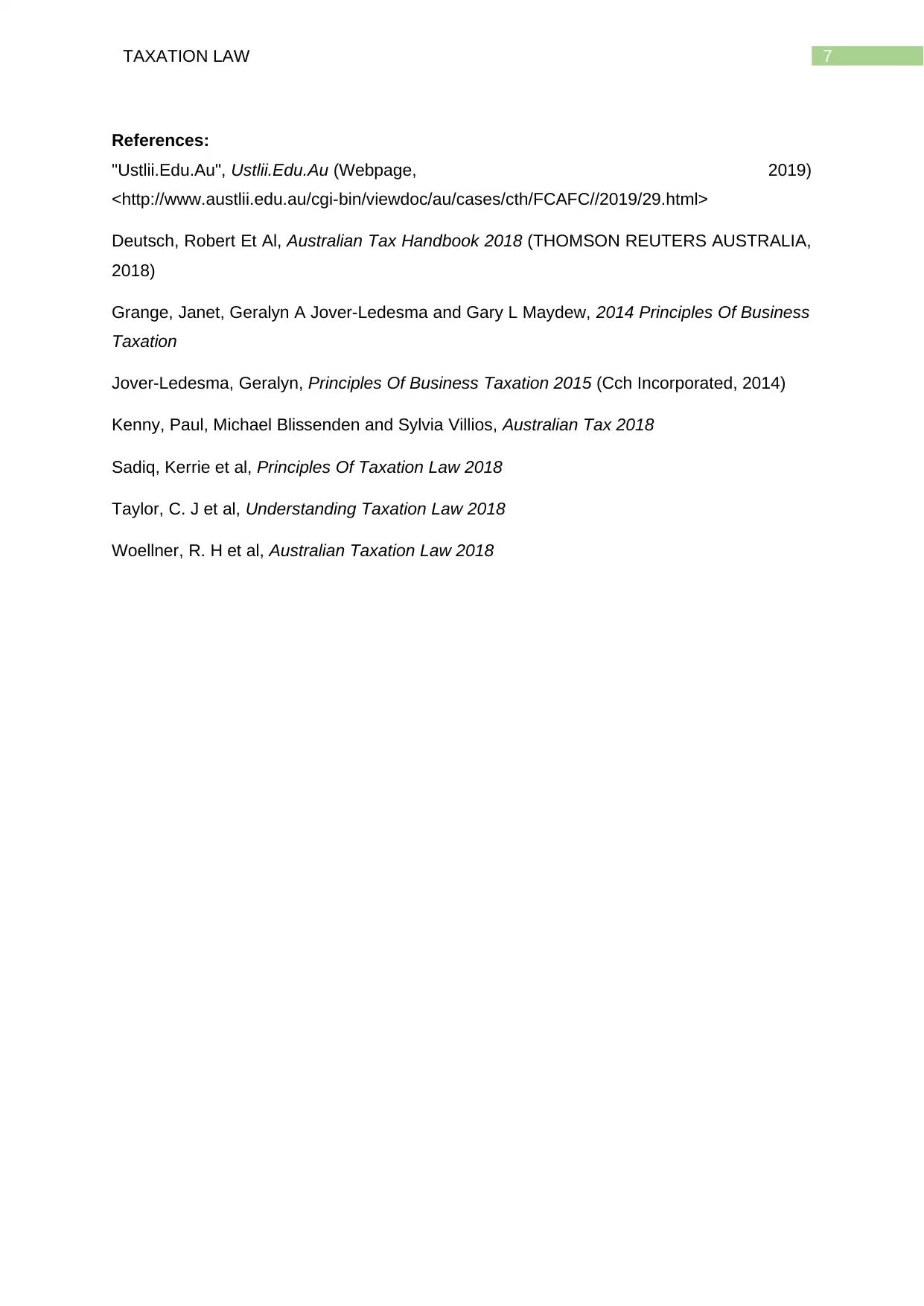
7TAXATION LAW
References:
"Ustlii.Edu.Au", Ustlii.Edu.Au (Webpage, 2019)
<http://www.austlii.edu.au/cgi-bin/viewdoc/au/cases/cth/FCAFC//2019/29.html>
Deutsch, Robert Et Al, Australian Tax Handbook 2018 (THOMSON REUTERS AUSTRALIA,
2018)
Grange, Janet, Geralyn A Jover-Ledesma and Gary L Maydew, 2014 Principles Of Business
Taxation
Jover-Ledesma, Geralyn, Principles Of Business Taxation 2015 (Cch Incorporated, 2014)
Kenny, Paul, Michael Blissenden and Sylvia Villios, Australian Tax 2018
Sadiq, Kerrie et al, Principles Of Taxation Law 2018
Taylor, C. J et al, Understanding Taxation Law 2018
Woellner, R. H et al, Australian Taxation Law 2018
References:
"Ustlii.Edu.Au", Ustlii.Edu.Au (Webpage, 2019)
<http://www.austlii.edu.au/cgi-bin/viewdoc/au/cases/cth/FCAFC//2019/29.html>
Deutsch, Robert Et Al, Australian Tax Handbook 2018 (THOMSON REUTERS AUSTRALIA,
2018)
Grange, Janet, Geralyn A Jover-Ledesma and Gary L Maydew, 2014 Principles Of Business
Taxation
Jover-Ledesma, Geralyn, Principles Of Business Taxation 2015 (Cch Incorporated, 2014)
Kenny, Paul, Michael Blissenden and Sylvia Villios, Australian Tax 2018
Sadiq, Kerrie et al, Principles Of Taxation Law 2018
Taylor, C. J et al, Understanding Taxation Law 2018
Woellner, R. H et al, Australian Taxation Law 2018
1 out of 8
Related Documents
Your All-in-One AI-Powered Toolkit for Academic Success.
+13062052269
info@desklib.com
Available 24*7 on WhatsApp / Email
![[object Object]](/_next/static/media/star-bottom.7253800d.svg)
Unlock your academic potential
Copyright © 2020–2026 A2Z Services. All Rights Reserved. Developed and managed by ZUCOL.




